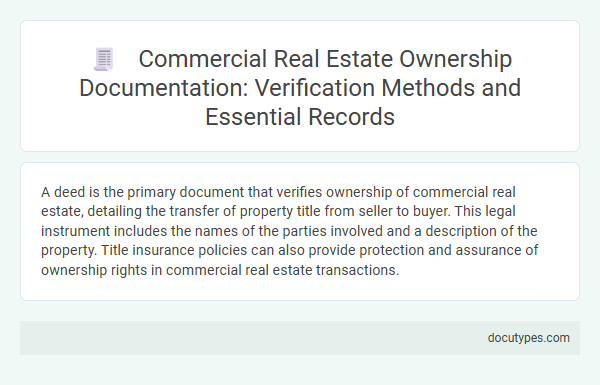A deed is the primary document that verifies ownership of commercial real estate, detailing the transfer of property title from seller to buyer. This legal instrument includes the names of the parties involved and a description of the property. Title insurance policies can also provide protection and assurance of ownership rights in commercial real estate transactions.
Introduction to Commercial Real Estate Ownership Documentation
| Introduction to Commercial Real Estate Ownership Documentation | |
|---|---|
| Document Type | Purpose of Document |
| Deed | The primary legal document that verifies ownership of commercial real estate. It includes details about the property, the current owner, and any transfer history. |
| Title Report | A comprehensive report that outlines the ownership status and any liens, encumbrances, or claims on the commercial property. |
| Title Insurance Policy | Protects Your ownership rights by safeguarding against potential disputes or defects in the title identified after purchase. |
| Property Tax Records | Government-issued documents that help verify ownership by listing the responsible party for property taxes on the commercial property. |
| Lease Agreements | While not proof of ownership, they provide evidence of control or use by the tenant and indicate the owner's rights over the property. |
| Survey Reports | Detail exact boundaries and dimensions of the commercial property, useful in confirming ownership and resolving disputes. |
Importance of Proper Documentation in Property Transactions
Ownership of commercial real estate is typically verified through a deed, which serves as the primary legal document proving your title to the property. A recorded deed includes detailed information about the property and the owner's rights, ensuring clear ownership.
Proper documentation in property transactions safeguards against disputes and legal challenges, making it essential for smooth and secure transfers. Maintaining accurate records protects your investment and confirms ownership legitimacy in future dealings.
Key Legal Documents for Commercial Real Estate Ownership
Verifying ownership of commercial real estate requires specific legal documents that establish property rights and transaction history. These documents provide essential proof for buyers, sellers, and lenders involved in commercial property deals.
- Deed - A deed is the primary legal document that transfers ownership and clearly identifies the current owner of the commercial property.
- Title Report - The title report summarizes the ownership history and reveals any liens, encumbrances, or claims affecting the commercial real estate.
- Mortgage Agreement - This document records any loans secured against the property, indicating financial obligations tied to ownership.
Title Deeds and Ownership Verification Methods
Verifying ownership of commercial real estate is essential for securing your investment and ensuring clear property rights. The primary document used for this purpose is the title deed, which legally proves ownership.
- Title Deed - This official document records the ownership details and legal description of the commercial property.
- County Recorder's Office Records - Public records at the local county office provide ownership history and any liens or encumbrances on the property.
- Title Search - A professional examination of past ownership and claims ensures the title deed is valid and free of disputes.
Secure verification through these documents guarantees your authority over the commercial real estate you intend to acquire or manage.
Role of Title Insurance in Commercial Property Deals
The primary document that verifies ownership of commercial real estate is the title deed, which provides legal proof of property ownership. Title insurance plays a crucial role in commercial property deals by protecting buyers and lenders from potential losses due to title defects or disputes. This insurance ensures the legitimacy of ownership, offering financial security throughout the transaction process.
Due Diligence: Assessing Authenticity of Ownership Records
The primary document verifying ownership of commercial real estate is the deed, which details the legal owner of the property. Due diligence involves examining the deed's authenticity by cross-referencing with county property records and title reports. Verifying ownership ensures the property title is clear and free from liens or disputes before any transaction.
Land Registry and Property Record Searches
What document verifies ownership of commercial real estate? The primary document is the title deed, which legally proves ownership of the property. Land Registry and property record searches provide official records confirming this ownership.
Verifying Historical Ownership and Transaction Chains
The primary document that verifies ownership of commercial real estate is the title deed. This legal instrument records the current owner's name and confirms their legal rights to the property.
Verifying historical ownership requires examining the property's chain of title, which is a sequential record of all previous transactions and owners. Title abstracts or title reports compile these transaction chains, revealing liens, encumbrances, or ownership disputes over time. Title insurance companies often provide these documents to ensure clear ownership before sale or financing.
Document Retention Requirements for Commercial Properties
Documentation verifying ownership of commercial real estate is essential for legal and financial purposes. Proper document retention ensures you maintain valid proof of ownership and comply with regulatory requirements.
- Deed of Title - The primary legal document confirming ownership of commercial property.
- Sale Contract - Records the terms and conditions of the commercial property transaction.
- Retention Period - Commercial property documents should be retained for a minimum of seven years to meet legal and tax regulations.
What Document Verifies Ownership of Commercial Real Estate? Infographic

